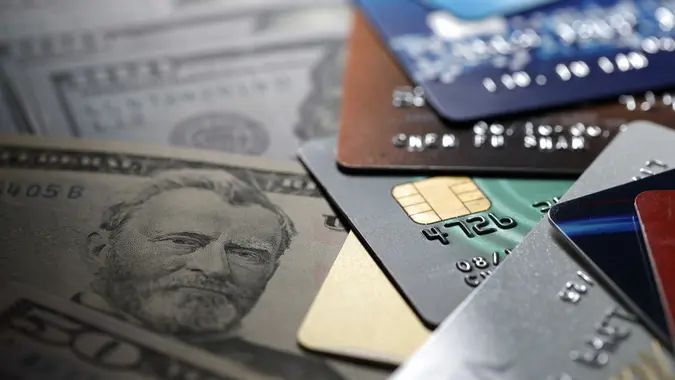What Is a Charge Card? Pros, Cons and When To Use One

Commitment to Our Readers
GOBankingRates' editorial team is committed to bringing you unbiased reviews and information. We use data-driven methodologies to evaluate financial products and services - our reviews and ratings are not influenced by advertisers. You can read more about our editorial guidelines and our products and services review methodology.

20 Years
Helping You Live Richer

Reviewed
by Experts

Trusted by
Millions of Readers
Although not as common as credit cards, charge cards are another flexible way to pay for everyday purchases. If you’ve never used one, you might wonder, “What is a charge card and how does it work?”
Unlike traditional credit cards, charge cards don’t charge interest — but they do require you to pay off your balance in full every month. Because of these unique features, charge cards aren’t right for everyone. Here’s what you need to know about this type of payment.
What Is a Charge Card and How Does It Work?
A charge card is an electronic payment card that allows you to make purchases without paying interest — as long as you pay off the full balance each month.
These cards typically don’t have a preset spending limit. However, you must pay off the balance in full each billing cycle to avoid late fees and penalties.
Charge Card vs. Credit Card: What’s the Difference?
Although they may look the same in your wallet, charge cards and credit cards operate differently. Here’s a side-by-side comparison of the features you can expect from charge cards vs. credit cards:
| Card Feature | Charge Card | Credit Card |
|---|---|---|
| Includes an annual percentage rate | No, not unless card features an option to pay over time | Yes |
| Requires you to pay the balance in full each billing cycle | Yes, unless card allows you to pay over time | No |
| Includes a preset spending limit | Card by card basis, typically no | Yes |
| Affects credit scores | Yes | Yes |
| Includes late fees | Yes, but can vary by card issuer | Yes, but can vary by card issuer |
| Includes an annual fee | Varies by card issuer | Varies by card issuer |
| Includes rewards | Depends on card issuer | Depends on card issuer |
Should You Get a Charge Card? Pros and Cons Explained
Before you decide to open an account, it can be helpful to examine the benefits and drawbacks of charge cards.
Pros of Charge Cards
- No preset spending limit: While your spending power isn’t unlimited, your limit adjusts based on factors like your payment history, credit score and financial profile.
- More control over debt: Because you must pay off the balance in full each month, it encourages responsible habits and avoids long-term debt.
- Perks and rewards: Many charge cards offer travel points, extended warranties, special event tickets and more.
Cons of Charge Cards
- Late fees apply: Missing a payment could result in late fees and potentially a hit to your credit score.
- Annual fees might apply: Some charge cards include annual fees of $100 or more. These fees may be worth it if you use the card frequently and benefit from the offered rewards.
- Risk of overspending: No preset limit can feel like a blank check — but if you overspend and can’t pay your bill, you’ll face late fees and card revocation.
- Fewer card options available: You won’t have a ton of options to choose from as charge cards are limited to just a few issuers.
Do Charge Cards Affect Your Credit Score?
Yes, just like credit cards, charge cards do affect your credit score. Here’s how:
- Practicing responsible habits, such as paying your balance in full and on time, will benefit your credit score.
- Pay your bill late and your credit score will likely suffer.
- Charge cards also impact your credit utilization rate, or the amount of total available credit you are using. This is a big factor in credit scores.
Good To Know
Creditors generally prefer to see a credit utilization ratio under 30%. Since charge cards don’t factor into this ratio the same way credit cards do, large purchases made on a charge card won’t impact your utilization ratio — which can be a plus for your credit score.
Final Take: Should You Apply for a Charge Card?
A charge card can be a smart tool for building credit and earning rewards — but only if you can use it responsibly. Since you’ll need to pay your balance in full each month, it requires financial discipline. If you’re confident in your spending habits and want premium perks, a charge card may be worth considering.
Elizabeth Constantineau contributed to the reporting for this article.
 Written by
Written by  Edited by
Edited by 

























